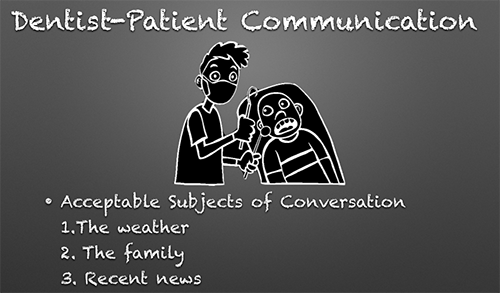
Have you ever wondered what kind of courses patients think you missed out on in college? They probably will never notice that you totally bombed the gold foil technique (neither will any dentist under 70, for that matter!). But they do wonder what you were taught about dealing with humans – the personal side, instead of the gushy clinical stuff.
Enter a bit of collegiate satire from a patient’s perspective. New DentalBuzz contributor Carolyn Roche has eight children and five grandchildren, a BA in Political Science from the University of Michigan, and is now studying English at Dixie State University in St. George, Utah where she lives with her husband, soon-to-be missionary for the Church of Jesus Christ of Latter-day Saints daughter, and two dogs. She occasionally begins her day with Special K, and would like to share this delightful suggestive nudge with all dentists and hygienists practicing now and into the future.
Lecture Notes on Dentist-Patient Communication
by Carolyn Roche
Professor Samuel Rose
Algonac Dental School
For Tuesday October 15, 2013
Today’s lecture is about communicating with your patient. No one wants to be the Frank Burns of the dental industry. You want your patient to have confidence in your wisdom and know that you will work on them with compassion and competence. We will discuss some guidelines about how and why you should maintain rapport and communication with your patient.
Acceptable Subjects of Conversation
Before you begin chewing out your patient for not flossing, break the ice by conversing about the following:
1. The weather. You can always jaw about the weather. Your patient has just come in from outside and can give you valuable updates. It will help them feel helpful to you.
2. The family:
a. You can drill him about his family. People always like to talk about their family.
b. You may talk about yours. You can forget about what Thumper said, “If you can’t say something nice, don’t say nothing at all.” It’s best to be honest with the patient or he won’t believe anything else you say. Tell him all the good and the bad about your family. Being open will encourage him to trust you as an honest person and like you as well. No one likes a goody-goody.
3. Recent acceptable news.
a. Crime. The patient will be happy to know which side of the law you are on. Always root for the good guy even though the bad guy is your brother. This could be another chance to talk about your family! Include all the crime details.
b. The economy. Let them know how much you earn and how much you have stashed away in safe investments. You will want to make an impression on them. Then make sure they pay the bill.
c. Medical news – if it throws a good light on professionals. If you have botched up anything recently, the patient will want to know the truth from the false rumors. Speak of your mistakes in detail. It’s okay to show off your knowledge. The patient will respect you more.
4. Remember to not get too personal with them. Forget the nonsense about building bridges to your patients. All patients should remain anonymous to you. You will be filling cavities for the rest of your life and to make YOU feel comfortable, think that they are just another cavity or tooth extraction. You will be less nervous and your patient will be less whiney. Once you get personal they will think they can complain about the pain. You don’t need that. It just wastes time.
How to Speak to Your Patient
However awkward, you must speak to the patient while you are working on them. Speaking to the patient with their mouth full is medically necessary. Make sure you have, at the least, the Hoover and a finger and a tool in their mouth.
1. Ask yes or no questions. A nod or a grunt means you haven’t frightened them enough to make them faint. Keep trying. Don’t mistake closed eyes for a faint; they are praying. There are no atheists in dentists’ chairs.
2. Ask questions that require a full sentence answer.
a. You can determine how frozen their mouth really is. If you can understand them, additional anesthetic may be required.
b. You can sue the patient for biting you. Dentistry can be an altruistic career, but remember your $1,500,000 in student loans need to be paid off before your children begin college.
After you have inflicted as much pain as possible, needle the patient about brushing and flossing. With the pain fresh in his mind he will be more likely to follow your recommendations. When you use these methods you will be filling your patients with tremendous motivation to have the healthiest teeth possible.
If You Need Help:
One of the great benefits of attending the Algonac Dental School is the support we offer to alumni opening their own practices. For a nominal fee of $500 –plus airfare, food, and accommodations- my staff and I will fly out and assess your new practice. We will help you streamline your operation. You won’t waste a moment in a day’s work after following our advice. For only $500 more, you can have the full, written report of our analysis and recommendations. NO OTHER dental school will offer this service! Call now for a FREE ESTIMATE 1-800-555-ROSE.
+++(Copy and hand out to students at end of class.)